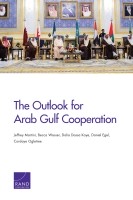| 来源类型 | Research Reports
|
| 规范类型 | 报告
|
| DOI | https://doi.org/10.7249/RR1429
|
| ISBN | 9780833093073
|
| 来源ID | RR-1429-RC
|
| The Outlook for Arab Gulf Cooperation |
| Jeffrey Martini; Becca Wasser; Dalia Dassa Kaye; Daniel Egel; Cordaye Ogletree
|
| 发表日期 | 2016
|
| 出版年 | 2016
|
| 页码 | 100
|
| 语种 | 英语
|
| 结论 |
- The GCC has always had high and low periods of cooperation and friction. Current and future trends are not likely to differ significantly from this historical pattern, but the consequences of intra-GCC dynamics are greater now with the growing activism of some member states.
- Fissures within the GCC reached a peak during the 2012–2014 period, largely over the role of the Muslim Brotherhood in regional politics. But the GCC was never in danger of dissolution due to overriding political and economic incentives binding the grouping together, particularly a common desire to preserve monarchical rule.
- While the conflict in Yemen has largely unified GCC states in the security realm, post-conflict transitions tend to exacerbate intra-GCC divisions, as was the case in Libya. Consequently, endgames in Yemen and Syria could engender tension among GCC states over what constitutes an acceptable outcome.
- An increase in the ISIL threat could increase intra-GCC cooperation, particularly in the areas of intelligence sharing and coordination between internal security forces.
- While GCC states are diversifying security relationships, such diversification is designed to increase the GCC states' leverage vis-à-vis the United States as its traditional security guarantor, rather than presaging a fundamental shift in the nature of the regional security order built on security relationships with the United States.
- Increased intraregional trade and growing infrastructure development are likely to drive enhanced GCC economic integration over the next decade, but monetary unification is unlikely.
|
| 摘要 |
- The U.S. government should maintain flexibility by sustaining both bilateral and multilateral engagement with GCC partner states, but seek to expand multilateral cooperation in key areas.
- While conditions do not appear ripe for the pursuit of deep political reform in the GCC, the United States should continue to raise human rights concerns with the GCC states and press for improvements on the basis of values and security benefits.
- Among the most-pressing issues in the near term is reassuring GCC partners that Washington remains committed to the region's security despite some limited U.S.–Iranian cooperation following the nuclear agreement.
- In the longer term, the United States would also benefit from encouraging GCC states to build a more-diversified and sustainable base for their prosperity and stability.
- The United States should more strongly incentivize its GCC partners to purchase weapons systems collectively, which would serve as a mechanism for GCC states to coordinate their acquisitions strategies and potentially evolve into more capable security partners.
|
| 主题 | Bahrain
; International Economic Relations
; International Organizations
; Oman
; Politics and Government
; Qatar
; Saudi Arabia
; Security Cooperation
; United Arab Emirates
|
| URL | https://www.rand.org/pubs/research_reports/RR1429.html
|
| 来源智库 | RAND Corporation (United States)
|
| 引用统计 |
|
| 资源类型 | 智库出版物
|
| 条目标识符 | http://119.78.100.153/handle/2XGU8XDN/108428
|
推荐引用方式
GB/T 7714 |
Jeffrey Martini,Becca Wasser,Dalia Dassa Kaye,et al. The Outlook for Arab Gulf Cooperation. 2016.
|
|
文件名:
|
x1535054926046.jpg
|
|
格式:
|
JPEG
|

|
文件名:
|
RAND_RR1429.pdf
|
|
格式:
|
Adobe PDF
|
除非特别说明,本系统中所有内容都受版权保护,并保留所有权利。